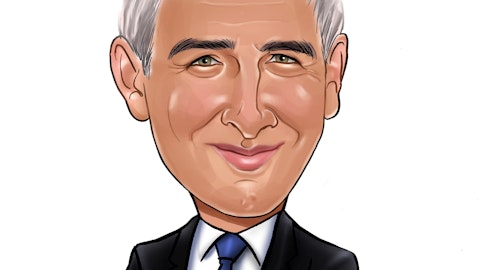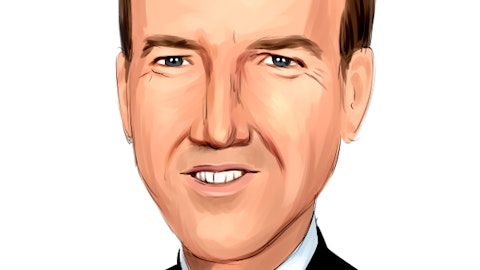A couple of months ago we published an article listing the best timeshare stocks to buy according to hedge funds. The biggest publicly traded companies in this industry are Wyndham Destinations, Inc. (WYND), Hilton Grand Vacations Inc. (HGV), and Marriott Vacations Worldwide Corporation (VAC). WYND shares are up more than 13%, HGV shares are up 16%, and VAC shares are up more than 15% so far today as investors are snapping up travel related stocks after Pfizer’s vaccine announcement.
In this article we share our exclusive interview with Brandon Barron and talk about the timeshare industry.

loca4motion/Shutterstock.com
Insider Monkey: Can you tell us about yourself? How did you decide to focus on fighting the timeshare companies? How big is your firm?
Sure. My name is Brandon Barron, and I am one of the Vice Presidents of Linx Legal. Our company was started because we saw the large amount of distressed timeshare owners. They were being sold something based on many misrepresentations. One of the main ones is that your timeshare will be an investment, which is simply not true. Timeshares are a depreciating “asset” – actually liability is probably the correct term to use here. Most timeshare have zero resale value on the secondary market. However, they do come with a lifetime of maintenance fees, which usually exceed the price that you could rent the same or similar property for.
Insider Monkey: How big is the timeshare industry? What percentage of timeshare owners are looking to get out of their contracts at any point in time?
The timeshare industry is huge. In 2019 timeshare sales increased by 7% to a staggering $12.5 billion. This was the 10th straight year of growth for the timeshare industry. As far as a percentage of owners looking to get out, that is a pretty tough question. Many people are still under the impression that their timeshare has real value.
Others may have realized there is no value in their timeshare, but people are oftentimes reluctant to admit that they made a mistake. It’s very difficult to come to terms that you may have spent between $40,000 and $100,000 on something that has no real value. Wyndham is still the biggest player in the timeshare industry, and we cancel more Wyndham timeshares than any of the other timeshare companies.
Insider Monkey: What kind of options do consumers have to get out of timeshare contracts? Can’t they just stop paying and walk away?
People can certainly just stop paying and walk away. However, this appears as a foreclosure on your credit report. I don’t think anyone wants a foreclosure on their credit report, and hence why we are in business. We work with the consumer, their timeshare developer, and certain regulatory agencies to cancel their existing timeshare contracts and associated mortgages. When we get a customer out of their contract, their obligation ends completely. They have no more mortgage payments, no more maintenance fees. Forever.
Insider Monkey: How do you help consumers to get out of timeshare contracts? What is your success rate for each situation?
As far how we help customers to get out timeshare contracts, I touched on that in the previous question. Our number one goal is to get them out of their timeshare mortgage payments and maintenance fees. Many of our customers do receive a refund from the timeshare developer as well, though that is not part of our guarantee. As far as our success rate goes, it is over 98%. In the rare case that we are not able to deliver a timeshare cancellation, we refund the customer in full.
Insider Monkey: Which timeshare companies have the most “air tight” contracts to break?
A contract is a contract, and is legally binding. To get out of a timeshare contract, you have to prove that there were gross misrepresentations made to you when signing that contract. I wouldn’t say that any timeshare companies have contracts that are more air tight than others. It really depends on the misrepresentations that were made to you, the customer. Unfortunately, elderly people are the perfect “prey” for timeshare sales people.
Timeshare sales reps will say about anything to get a timeshare sold. You may be told a deal is good for “today only”, you may have been told that you could sell the timeshare at a later date for a profit, you may have been told that you could turn a profit by renting out your timeshare. All of these are false, and are oftentimes grounds for the consumer to exit their timeshare contract.
Insider Monkey: Let me ask this question differently. If you have to buy the stock of one of the publicly traded timeshare companies, which one would you buy?
I would definitely say Disney (DIS). First of all, we don’t cancel any Disney timeshares at all. They do things the right way. They don’t lie to their customers about what they are purchasing. Disney is a magical place to be, and their timeshare owners as a whole are a happy group. On top of that, Disney also obviously has many more revenue streams than timeshare. I would imagine timeshare sales make up a very small portion of their portfolio. They have theme parks, movies, television shows, merchandise sales, and much more.
Insider Monkey: Do you have any advice for consumers who are looking to buy timeshares?
Don’t buy a timeshare at all, period. There are always timeshares listed for $1 on ebay. Those are still not typically a good buy. Consumers think they are purchasing a lifetime of vacations for $1, when in fact what they are purchasing a lifetime liability in the form of maintenance fees. You will find that you can rent the same or very similar property for cheaper than yearly timeshare maintenance fees.
Disclosure: No positions. We didn’t ask Brandon Barron whether he owns any positions in any of the stocks mentioned in this article, so his answers might be biased. Insider Monkey doesn’t recommend purchase/sale of any securities. Please get in touch with a financial professional before making any financial decisions. You understand that Insider Monkey doesn’t accept any responsibility and you will be using the information presented here at your own risk. You acknowledge that this disclaimer is a simplified version of our Terms of Use, and by accessing or using our site, you agree to be bound by all of its terms and conditions. If at any time you find these terms and conditions unacceptable, you must immediately leave the Site and cease all use of the Site.





